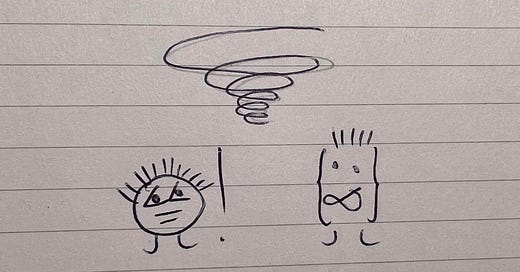Zeitgeist is a law of nature
There is a lot of quantum theory-theory in the junk room. And vice versa.
The zeitgeist is just as objective a fact as everything else in the natural sciences. - Is this a corona denier, an ivermectin eater, a Putin apologist? Have we landed in the ultimate confusion chaos if we can even put such a thought into words?
It gets even better.
This sentence was written by Werner Heisenberg, Nobel Prize winner in physics and central figure in quantum theory. And he was serious about it.
What does it mean when a scientist - not just any scientist, not a social scientist wrapped in jute sacks, but a physicist, a representative of the most exact science except perhaps mathematics - comes to such a diagnosis? Has he been staring at the universe for too long and lost his mind over unsolvable problems?
This statement is not unusual for Heisenberg. It is a logical and quite unspectacular consequence if the results of the most relevant science are taken seriously, an actual direct and scientific derivation of the principles of quantum theory - only slightly more far-reaching than the more well-known position that we cannot determine the location and movement of a particle at the same time.
Why can't we?
Because - neither in quantum experiments nor in other life situations - we are not outside observers of a world that is independent of us and that opens up to us if we just look closely and rationally enough. We are part of this world. Heisenberg diagnosed this quite briefly, almost 30 years before Bruno Latour and other representatives of laboratory studies came to similar conclusions with anthropological field research among practicing scientists and questioned the separation of nature and culture that was still popular in the natural and technical sciences.
The movement that a researcher wants to describe, to stay with this example, is possible because a concept of space is presupposed, through which a part moves in a certain time (also a presupposed concept). In addition, it is assumed that the part to be observed remains constant and identical to itself. This is also an assumption that has been softened more and more in the search for the foundations of matter, which has brought more and more elementary particles to light.
What does all this have to do with a vague term like zeitgeist?
Zeitgeist is something composite, complex, dynamic and subject to changes that are difficult to control. Something that is difficult to communicate, but which has a massive influence on what is perceived as important and how things are understood. You understand zeitgeist when you are in the midst of it. The later description of past zeitgeist is always a controversial reconstruction.
Scientific facts are theories that have a very high probability of being true. This means that they are sometimes just as complex, dynamic and subject to change.
Does Heisenberg therefore advocate relativism and arbitrariness? On the contrary, Heisenberg is an advocate of clear theories of truth. Strict truths, however, need spacious junk rooms in which anything that could disturb them can disappear. For Heisenberg, the stairway to the junk room is language. Everyday language is ambiguous, not very precise - but tested on messy reality. Scientific language and mathematical formalism are precise - and therefore very limited in their application. Nevertheless, we understand something in both cases. Just as we understand the zeitgeist. Because it doesn't get any more precise if we ask more precisely.
Definitions and the junk room of logic
"Facts are true by definition!" - someone recently said to me after reading my notes on Knorr Cetina's "The Fabrication of Knowledge". This is an interesting objection - not so much because of its actual intention, but because it focuses on the role and function of definitions.
it doesn't get any more precise if we ask more precisely.





